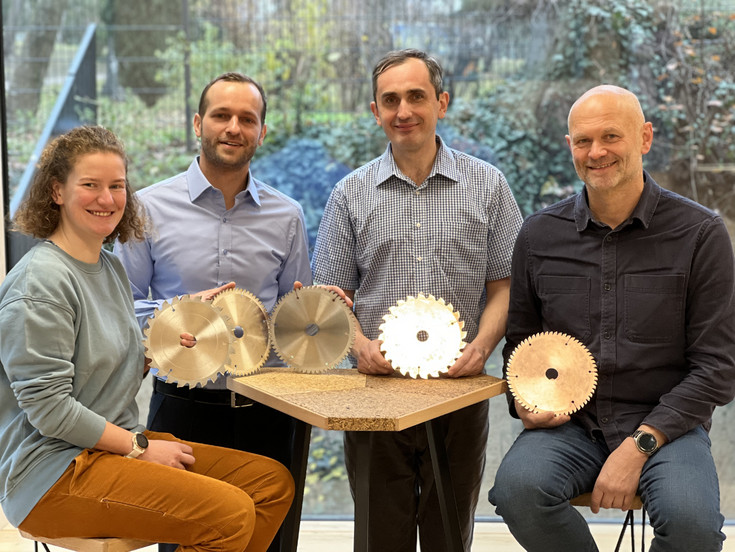15.12.2022 - Reduction of fine dust in woodworking - affordable and accessible for all

(v.li.) Dissertantin Lena Leiter (BOKU), Christopher Detzel (Holzprofi Austria GmbH.), Roman Myna (BOKU), Rupert Wimmer (BOKU). ©Öffentlichkeitsarbeit/Jakob Vegh
A method developed at BOKU, which uses the triboelectric effect, is now to be implemented together with the company Holzprofi Austria GmbH.
The problem of fine dust in woodworking is often not taken seriously enough. After all, wood dust can be attacked and it usually smells pleasantly of fresh wood, which can lead to the false assumption that it is not hazardous to health. In fact, hardwood dust below a certain particle size is clearly classified as a carcinogenic agent. Modern environmental and occupational health and safety methods are therefore becoming all the more important, and there is a need for new, innovative methods such as those researched and developed by the working group of Univ. Prof. Rupert Wimmer at the Institute of Wood Technology and Renewable Resources at the University of Natural Resources and Life Sciences, Vienna.
Completely new applications
Specifically, the researchers are using the so-called triboelectric effect to get a better grip on wood dust. In this process, the electrostatic charges on the smallest wood dust particles are changed in such a way that more clumps can form, which are extracted more efficiently and thus less easily enter human respiratory tracts. By specifically optimizing the size of the dust particles, even at high processing speeds, and at the same time reducing the dust clouds by means of technical devices that can be attached to commercially available machines, tools, or extraction systems, new, energy-saving and economical application possibilities are now available for woodworking.
An important basis for this is the dissertation by Roman Myna, whose measurements confirmed a previously unknown finding, namely that dust particles from woodworking processes are electrostatically charged at the same pole. A consequence of this is the explanation of dust cloud formation in working areas, which is intensified by the repulsive forces of the dust particles. As a result of the research of the BOKU working group of Rupert Wimmer, in cooperation with the Kompetenzzentrum Holz GmbH, and through the participation and diverse support of the companies Holzprofi Austria GmbH and Albin Kraus GmbH in a three-year FFG BRIDGE project, several patents for dust-reducing measures for woodworking could be registered.
Also suitable for do-it-yourselfers
"Our research shows how a basic, physical phenomenon that we were able to find on wood dust particles can lead to several, practical applications to thereby reduce wood dust exposure in the workplace," explains Rupert Wimmer.
Holzprofi Austria GmbH, which holds two patents, is now working with BOKU experts on solutions that will make the new method of reducing wood dust affordable and accessible to everyone - from industrial companies to do-it-yourselfers. This is because the filter and extraction systems currently in use are often not affordable for small and medium-sized enterprises or one-person businesses. In addition, the ever-increasing rotational speeds of the tools create such strong air-dust mixture turbulence that reliable extraction and filtering with existing extraction systems are insufficient.
"The traditional research focus has tended to be on the development and optimization of inexpensive and robust filter media for surface filtration," explains BOKU researcher Roman Myna. "Nevertheless, the effectiveness of existing devices for air purification is directly dependent on filter area size and filter permeability and cannot be optimized arbitrarily. So conventional dust removal methods are clearly reaching their limits."
Company supports research
This is exactly why Holzprofi, as an environmentally conscious and traditional Austrian company for woodworking machines and tools, has decided to support the innovative research results of BOKU and to bring the results to the market.
"We are pleased that we as Holzprofi are allowed to support BOKU in their research on this important issue, because when it comes to the topic of dust pollution, especially smaller companies and hobby craftsmen often miss out. Holzprofi is currently supporting four master theses as well as two dissertations at BOKU and we would like to thank them for the many years of good cooperation", says managing director and owner Christopher Detzel.
Holzprofi Austria, as an Austrian family business, has been selling machines, tools and accessories for wood and metal processing directly to ambitious hobby craftsmen, professional craftsmen, to farmers and to large companies for more than 30 years. Several brands are part of the portfolio (Holzprofi Austria, Holzprofi Maker, Hans Schreiner, Hauslhof, Forestor Pilous) and in three locations and via the Internet end customers are served throughout Austria and in Europe.
Contact & Inquiries:
Univ.-Prof. DI Dr. Rupert Wimmer
Institute for Wood Technology and Renewable Resources
University of Natural Resources and Applied Life Sciences Vienna
rupert.wimmer@boku.ac.at
+43 1 47654-89156
Christopher Detzel, MSc.
Holzprofi Austria GmbH.
christopher.detzel@holzprofi.com
+43 7613 5600
